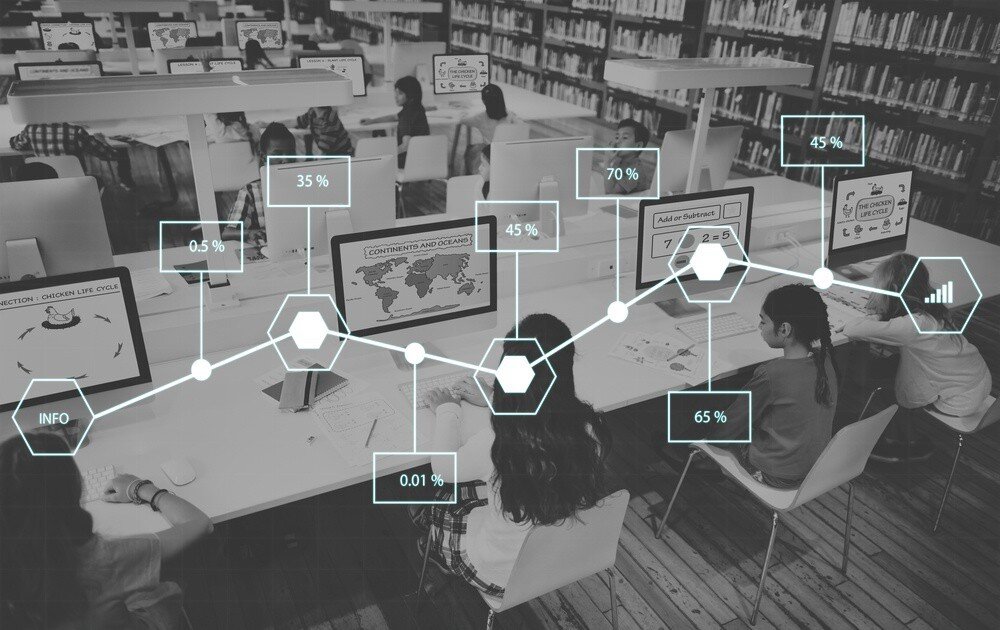Talks about Big Data and its development throughout the last years keep on buzzing. Experts discuss various spheres of application and analyze how Big Data can improve our lives. One of the main spheres to focus on is education. Considering the capacities of this technology, the academic setting can be transformed into something new and exciting with its help.
Big Data is used by various organizations to collect and interpret large amounts of information. The analysis provides in-depth insight into their everyday practices and efficiency. Big Data in education is a tool to track learners’ interactions, progress, attitude to materials, and more. Analyzing these aspects, Big Data will help the researchers find out how to improve the learning environment.
Let’s discuss the most crucial changes Big Data can bring to the academic world.
Understanding students and improving their performance
The main problem with modern education is the lack of individual approaches. Each student has to face unique difficulties and has particular problem areas that are not covered with standardized programs and solutions. Analyzing the issues of every particular learner is the key.
Big Data allows teachers to understand students’ needs and formulate specific decisions suitable for a particular person. With the help of adaptive learning, they can recognize the struggles of each student and discover individual ways to cope with them.
Big Data allows for pitching the learning program to each person and provides additional time for the most complicated subjects without losing the tempo of an entire class. When the issues are recognized and solved in real-time, students have fewer problems with further themes.
Colleges and universities that already use Big Data analytics to track students’ performance can boast of having better outcomes. Educators keep an eye on each learner and evaluate his/her successes to know how to improve their results. Knowing the strong and weak sides of each learner, teachers prepare them for admissions and future careers. Each student receives an individual learning plan constructed on the basis of the information gathered by the Big Data technology. As such, they strengthen their talents and improve weak points in real-time.
Adaptive learning: say “no” to standardization
Digitalization of our everyday life cannot gloss over classrooms. We use electronic devices to meet all the needs of our living, whether entertainment, work, or basic necessities. Education relies on technologies more and more these days, adapting such tools as cloud storage, online classrooms, libraries, and numerous sites where students can find “someone to do my essay for me.” Writing, researching, reading, and sharing becomes simple with smartphones and laptops. Teachers can manage students’ assignments online, organize video conferences, and track their progress basing on various applications.
Big Data supports the idea of digital learning, like no other technology. One of the main features to mention here is adaptive learning. This approach allows constructing a curriculum for every student, considering his/her capabilities and preferences. As such, we have the following benefits:
- Customized plans for learners
- Better performance
- Fast progress
Harvard is already using this feature as a part of their online learning project. HarvardX provides numerous courses that are customizable, considering students’ preferences. This project works as a part of an offline program and shows stunning results. Experts claim that adaptive learning increased engagement and progress in more than 20% of learners.
Advanced engagement and attendance tracking
Big Data and education go hand in hand when it comes to engagement and attendance tracking. Facial Recognition technology encourages students to log their attendance when they are in class. Also, it allows teachers to see if students are still interested in the study materials. If the application informs them about the opposite, they can take immediate action to encourage and motivate learners.
Biometrical devices are also helpful when it comes to motivation. They track brain signals when students are working on the content, discovering what impacts them positively and drives interest. As such, teachers will have an idea about the materials that evoke students’ desire to learn and adjust the current program to meet these needs.
The ethical side of the question
The digital age and massive adoption of new technologies raise numerous ethical questions. The top issue is privacy. Even when the data is collected for positive purposes, this might violate students’ right for confidentiality. What should we do?
- Encrypt and anonymize data
- Ask for students’ permission before collecting their data
- Avoid scenarios of discrimination (for example, expulsions on the basis of negative performance predictions)
Not only should we learn how to use new technologies for education, but also develop ethics that will prevent undesirable violations of students’ rights.
Conclusion
Big Data is all about real-time analysis, improvement, and planning. This is an extremely strong technology that will definitely improve the educational programs worldwide. The higher level of personalization, customized curriculum, and engagement tracking allows teachers to understand learners better and help them improve their results constantly. The academic environment will expand wider and discover new opportunities for both – online and offline classrooms.
Of course, new technologies are connected to new challenges. Ethical issues, privacy, and low tech-savviness are the points to be addressed in case we want Big Data to change our lives to better.
Author’s Bio:
Melissa Cartew writes informational and academic articles within numerous spheres. Currently, she works on the project devoted to statistical analysis. Apart from writing, Melissa is interested in coding and application development.
This post is a guest post contribution by Melissa Melissa Cartew.


Leave a Reply